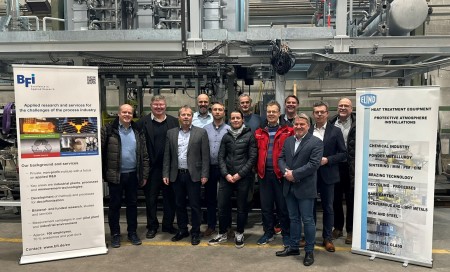Daily press, 2024-03-07, 09:30 am
Research for hydrogen-based steel production: contract awarded for the construction of a direct reduction test facility at thyssenkrupp Steel's Duisburg-Nord site
- The contract to build the facility has been awarded to TS Elino from Düren
- VdEh Institute for Applied Research (BFI) will be the client and operator of the direct reduction test facility
- Objective: Research into climate-neutral hot metal production with hydrogen
- Optimization of operating points for thyssenkrupp Steel's direct reduction plant which is under construction
Duisburg, March 2024. The Düren-based plant builder TS Elino will build a direct reduction test facility, including the associated auxiliary units, at thyssenkrupp Steel's Duisburg-Nord site. The client is the VdEh Institute for Applied Research (BFI). The project aims to advance research into the direct reduction of iron ore. The order volume for the direct reduction plant on a demonstration scale is worth around 10 million euros, and forms part of the "energy transition real-world laboratories" H2Stahl project funded by the German Federal Ministry for Economic Affairs and Climate Protection (BMWK). The consortium partners thyssenkrupp Steel and the VdEh Institute for Applied Research (BFI, project coordination) will be trialling the technological leap into hydrogen-based, carbon-neutral hot iron production with the construction and experimental operation of a direct reduction test facility.
Flexible research tool: Innovative direct reduction test facility with high variability
The planned facility will be about 40 meters in height, and will be able to reproduce various direct reduction processes. As a result, it will offer maximum flexibility for research into direct reduction. Equipped with the most innovative measurement, control and regulation technology, the facility will make it possible to use various reduction gases such as hydrogen, natural gas and the mixed gases produced during steelmaking. Since it is not tied to a specific direct reduction process, it will be possible to operate the facility in a technology-open manner with different feedstocks such as pellets, lump ore and recycled materials. The test facility will have a capacity of 100 kg/h of directly reduced iron, and will be connected to the media and infrastructure of the nearby Carbon2Chem Technical Center.
Test campaigns for optimizing and simulating industrial plants
The Institute for Applied Research (BFI) is coordinating the project, and will be responsible for operating the test facility; the first test campaigns are planned for early 2026. In this way, it will be possible to optimize future operating points and simulate the integration of the facility into the process network of an iron and steel works before the plant currently under construction is commissioned on an industrial scale. In addition to CO2 savings, product quality and plant performance, the research also aims to gain insights into plant handling and safety. The tests will be accompanied by simulations and special investigations into reduction plants at the Technical Center of the VdEh Institute for Applied Research (BFI) in Düsseldorf. These will enable research at various scales (technical center facility, direct reduction test facility, industrial plant). The test facility will make an important contribution to the industrial implementation of hydrogen-based direct reduction.
thyssenkrupp Steel is one of the leading suppliers of high-grade flat steel and stands for innovations in steel and high-quality products for innovative and demanding applications. Steel has a good 26,000 employees and produces about 11 million metric tons of crude steel per year – making it Germany’s largest flat steel manufacturer. Its capabilities range from custom material solutions to material-related services.
As a pioneer in climate transformation, thyssenkrupp Steel has set itself the goal of reducing its CO2 emissions by more than 30% annually as early as 2030. By 2045 at the latest, the steel production is planned to be completely carbon-neutral. Thanks to funding from the national and regional governments for thyssenkrupp Steel's tkH2Steel® project at the Duisburg site, the pioneering transformation is becoming reality: the production of premium steel with green electricity and hydrogen-based direct reduction technology. The starting point for the transformation will be a first direct reduction plant with innovative melting units. As a major consumer of green electricity and hydrogen, thyssenkrupp Steel is also a pioneer of the green energy infrastructure of the future.
VDEh-Betriebsforschungsinstitut, based in Düsseldorf, is one of Europe's leading institutes for application-oriented research and development in the process industry. Increasing demands on product quality, production costs, CO2 emissions and plant utilization are posing new challenges for the steel industry. The BFI offers tailored innovations along the entire process chain of steel production, from the input materials down to the end product. Its research activities include CO2 reduction and energy efficiency, process and process chain optimization, circular economy, Industry 4.0 and measurement technology.
The scientists at the BFI are supporting the transformation of the steelmaking in close cooperation with the industry and policymakers. This includes not only activities to investigate the technologies through experimentation and simulation as part of publicly funded research projects, but also collaboration in initiatives such as IN4climate.NRW or scientific work within SCI4climate.NRW.





